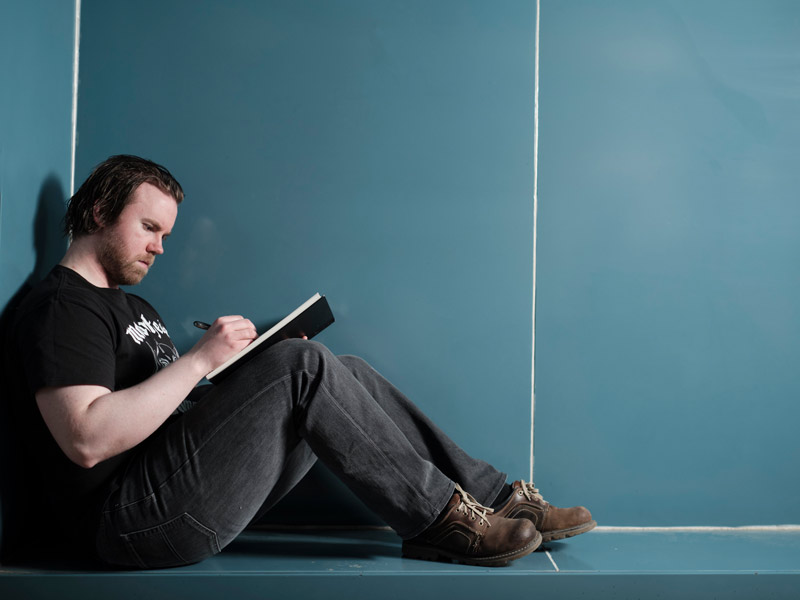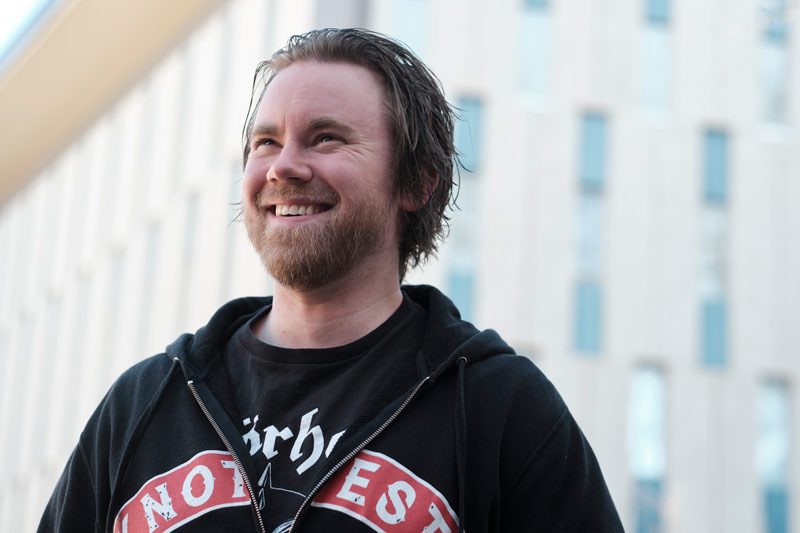YOU MAY HAVE recently watched the movie The Upside, with Brian Cranston of Breaking Bad fame in the co-lead as a paraplegic who hires a tough ex-con to wheel him around in his chair. They both learn a lot from each other and it’s a real feel-good story, one Hollywood took from the French Les Intouchables.
It’s the kind of movie—see also Me Before You, Million Dollar Baby—that makes Dr. Adam Pottle’s blood boil.
![[icon image] Cover image of Voice courtesy of University of Regina Press](images/adam_pottle_VOICE.jpg)
It’s what he and other people in the Deaf and disabled community call inspiration porn. They see it every day around them, the same old stories of people overcoming a disability of some kind to really start living. The Upside features an able-bodied actor in the role of the paraplegic getting his gritty lessons, while the injured in the other two movies realize that their now disabled lives aren’t worth living.
For Pottle, a lifetime of deafness is something he has learned to live with and from which to draw strength. His new book, Voice: Adam Pottle on Writing with Deafness, is part memoir of growing into a life of education and writing, and part notes on craft—the beneficial side of his deafness.
“I wouldn’t be a writer if I wasn’t deaf,” he says. “With my deafness I have a bivouac around my imagination. No distractions, and my mind is free to roam.
“For me,” he continues, “deafness has kept alive the child-like part of me. It’s helped me maintain my curiosity.” And, he says, it’s helped develop his empathy and helped him be mindful of other people.
Pottle, who’s originally from Kamloops, B.C., earned his first two degrees at the University of Northern British Columbia in Prince George. He completed his PhD at the University of Saskatchewan in 2016, working with English professors Dr. Kathleen James-Cavan and Dr. Kevin Flynn while writing on how deafness and disability are portrayed in Canadian novels since 1984.
“They were very patient with me,” he says, “though they did have to warn me a few times about how long I was taking.”
It took him just under seven years to complete his doctorate.
While that’s hardly a record for longest time to complete a degree, it’s not as if Pottle was sitting around waiting for inspiration to strike. While he worked on his PhD he completed his first collection of poems, Beautiful Mutants, including poems such as “Deaf Speech” in which he worked at “test(ing) the limits of language … both by disrupting the structures of English and by embracing (his) inability to hear properly.”
After that came Mantis Dreams: The Journal of Dr. Dexter Ripley, a novel in which an academic chooses a life as a disabled person so that he may give all his energy to research and writing. The title character views disability not just as a physical, mental or intellectual condition, but as a philosophy. Mantis Dreams won the 2014 City of Saskatoon and Public Library Saskatoon Book Award.

Pottle’s second novel, The Bus, rolled around in his head and heart for eight years, starting while he was working on his MA. It’s about a little-known story from disability history in which 275,000 people were exterminated by the Nazis between 1941 and 1945. He travelled to Germany to visit the euthanasia centre in Hadamar, where he spent 10 days going through patient files and, in some cases, simply sitting in the gas chamber for hours to absorb the voices of disabled people sent there to die.
During this time he was supposedly devoting himself to his doctorate, he also wrote and had performed his first play, Ultrasound, by Cahoots Theatre/Theatre Passe Muraille in Toronto. Not coincidentally, considering his trip to the euthanasia centre, it’s a play about genetic screening, only in Pottle’s case he reverses the common logic and asks, what kind of person would abort a child because it was normal? Because deafness is the world he knows and is comfortable with, the deaf husband in this play wants a deaf child.
Considering all that Pottle talks about in the first section of his new book, Voice, in which he describes at length the agonies he went through simply trying to be an ordinary kid who happened to be deaf, it’s not surprising that he would view deafness as his norm.
One of the most poignant and affecting sections in Voice comes when Pottle describes the differences between his master’s thesis defence and the one for his PhD. In the first, despite all his preparedness, including PowerPoint presentations, his external examiner was unable to make it to town and was then set up on a conference call through a tinny phone speaker. Pottle could not hear her. His anxiety exploded and he couldn’t attend to the other examiners in the room. He passed, but he says he felt like a fraud. He hadn’t been able to be true to his material or the way he wanted it to come across.

By contrast, when he defended his PhD thesis, his external examiner not only made it, but his department enabled him to have every back-up plan ready, including a captionist who typed everything that was said or asked of him. Seeing the examiner speak the words in a quiet room and reading what was said gave him the confidence he needed to do the best job he could. Responding to Pottle’s thesis on “the most dynamic portrayals of disability in Canadian literature,” the graduate chair in English said, “People were very positive about your oral defence. They said you did a stellar job.”
This is what happens when the right tools are marshalled and people are given a chance to do their best work. It’s what Voice is all about: a man’s struggle with finding who and what he is and, having found that, putting in place what he needs to be his best—what he calls his most expressive self. Pottle’s prodigious output speaks for itself.